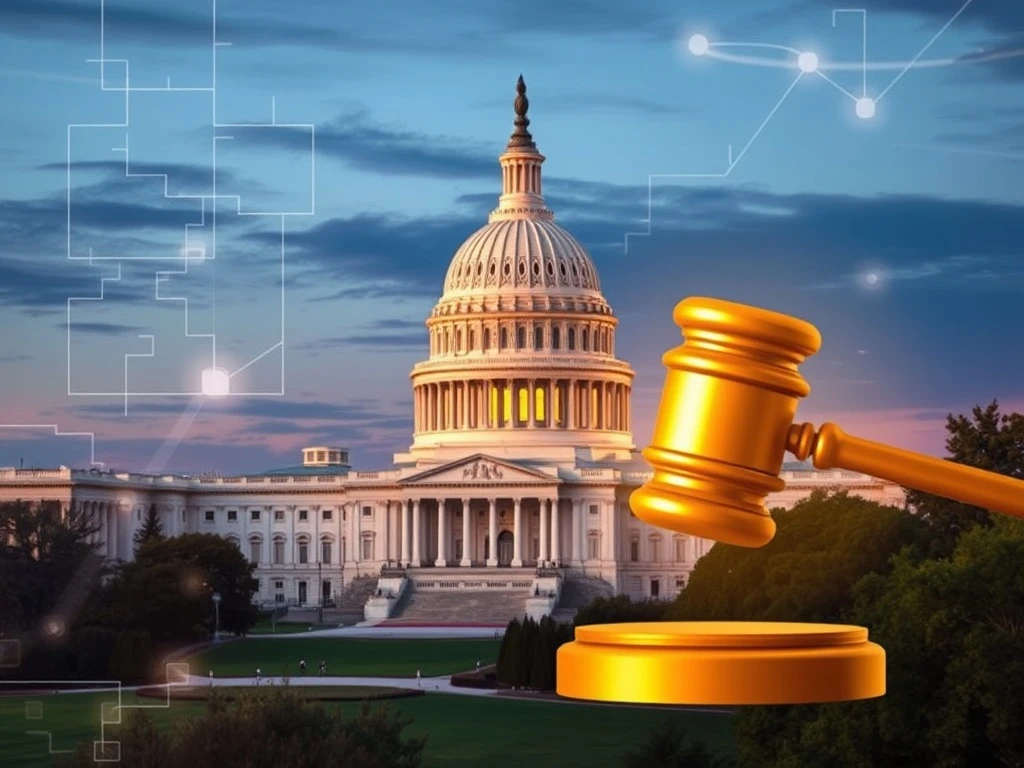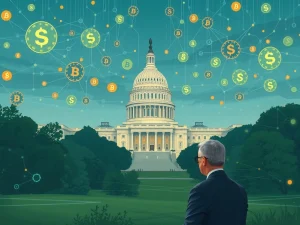Crucial Crypto Regulation: US Congress Prepares for Pivotal ‘Crypto Week’ to Shape Digital Assets’ Future

The cryptocurrency world is holding its breath. As the US Congress gears up for what’s been dubbed ‘crypto week,’ the stakes for crypto regulation have never been higher. This isn’t just another legislative debate; it’s a pivotal moment that could define the future of digital assets in America, bringing much-needed clarity or prolonging uncertainty. The industry, from grassroots advocates to major players, is mobilizing with unprecedented urgency, aiming to transform momentum into concrete digital asset legislation.
US Congress Takes Center Stage: What’s on the Agenda?
From next Monday to Friday, the US House of Representatives is set to dive deep into the complexities of digital assets. This legislative push, branded ‘crypto week’ by Republican leadership, signifies a growing recognition of cryptocurrency’s impact on the economy and financial landscape. Lawmakers are expected to debate and potentially vote on three high-profile bills, each carrying significant implications for how digital assets will be overseen and integrated into the broader financial system.
Here’s a quick overview of the key bills:
- The CLARITY Act: This bill aims to define regulatory oversight for crypto markets, addressing long-standing questions about which federal agency—the Securities and Exchange Commission (SEC) or the Commodity Futures Trading Commission (CFTC)—has jurisdiction over various digital assets. Its passage could provide a much-needed legal framework, reducing regulatory ambiguity that has stifled innovation and investment.
- The GENIUS Act: Focused on stablecoins, this legislation seeks to create a comprehensive framework for these digital currencies pegged to traditional assets like the US dollar. Having already cleared the Senate, its consideration in the House underscores a bipartisan desire to regulate stablecoins, which are seen as a critical bridge between traditional finance and the crypto economy.
- The Anti-CBDC Surveillance State Act: This bill directly targets the potential creation of a US central bank digital currency (CBDC), aiming to ban its development. Proponents of this bill express concerns about privacy, government surveillance, and the potential for a CBDC to centralize financial power.
The Urgent Push for Digital Asset Legislation
The crypto community and advocacy groups are not just observing; they are actively pushing for these bills to pass. Mason Lynaugh, community director at Stand With Crypto, a prominent nonprofit advocacy organization backed by Coinbase, emphasizes the critical nature of this moment. “We’re seeing some unbelievable momentum, unbelievable attention and focus and bipartisan support for crypto as a topic,” Lynaugh stated. This sentiment is echoed across the industry, which views ‘crypto week’ as a make-or-break opportunity.
The urgency stems from several factors:
- Global Competitiveness: Other nations are advancing their regulatory frameworks for digital assets, potentially leaving the US behind in terms of innovation and market leadership. Clear digital asset legislation is seen as vital for maintaining America’s competitive edge.
- Consumer Protection: Without clear rules, consumers and investors remain vulnerable to scams, market manipulation, and the fallout from unregulated entities. The industry believes that responsible regulation can foster trust and encourage broader adoption.
- Economic Certainty: Businesses and developers in the crypto space need a predictable legal environment to build and invest. Regulatory uncertainty deters capital and talent, hindering the growth of a nascent but powerful sector.
Just days before Congress convenes, Stand With Crypto, alongside more than 65 other firms and advocacy groups, submitted a collective letter urging House lawmakers to support the CLARITY Act. This concerted effort highlights the industry’s unified voice and its commitment to constructive engagement with policymakers.
Deciphering the CLARITY Act: A Path to Clearer Crypto Regulation?
The CLARITY Act stands out as a cornerstone of the proposed legislative package. Its primary objective is to resolve the long-standing jurisdictional dispute between the SEC and the CFTC over various digital assets. Currently, many cryptocurrencies exist in a gray area, making it difficult for projects to comply with regulations and for investors to understand their protections. Lynaugh highlighted the bill’s comprehensive scope: “This bill covers all of the questions about what does the SEC do? What does the CFTC do? What do token launches look like? What is decentralization?”
The benefits of such clarity are manifold:
- Reduced Regulatory Arbitrage: Clear definitions would prevent companies from choosing jurisdictions based on laxer rules, promoting a level playing field.
- Enhanced Investor Confidence: When investors know which rules apply and who enforces them, they are more likely to participate in the market.
- Innovation Acceleration: Developers can build new products and services with confidence, knowing the legal boundaries. This is crucial for sectors like Decentralized Finance (DeFi) and new token models.
- Improved Consumer Protection: By assigning clear oversight, the bill aims to ensure robust consumer safeguards are in place, protecting against fraud and market abuses.
Without the CLARITY Act, the US risks remaining in a state of regulatory limbo, which could push innovation offshore and continue to expose consumers to unnecessary risks. This legislation is seen as foundational to establishing effective crypto regulation in the United States.
Building a Robust Stablecoin Framework
The stablecoin framework proposed by the GENIUS Act is another critical piece of the legislative puzzle. Stablecoins, digital assets designed to maintain a stable value relative to a fiat currency (like the US dollar) or other assets, play a vital role in the crypto ecosystem. They facilitate trading, provide a safe haven during market volatility, and enable efficient cross-border payments.
The need for a clear framework stems from:
- Financial Stability Concerns: The rapid growth of stablecoins, particularly those backed by reserves, has raised questions about their potential impact on broader financial stability if not properly managed.
- Consumer Trust: Incidents involving algorithmic stablecoins losing their peg have highlighted the need for transparency and clear rules regarding reserve requirements and redemption mechanisms.
- Interoperability: A consistent regulatory approach could foster greater interoperability between stablecoins and traditional financial systems, unlocking new use cases for payments and remittances.
The GENIUS Act aims to provide the necessary guardrails, ensuring that stablecoins are issued and managed responsibly. Its passage would signal a mature approach to integrating these digital assets into the mainstream financial system, potentially paving the way for broader adoption of digital payments and financial innovation.
The Anti-CBDC Surveillance State Act: Protecting Financial Freedom?
Beyond market structure and stablecoins, ‘crypto week’ also touches upon a more fundamental debate about the future of money itself with the Anti-CBDC Surveillance State Act. A Central Bank Digital Currency (CBDC) is a digital form of a country’s fiat currency, issued and backed by its central bank. While proponents argue CBDCs could enhance financial efficiency, inclusion, and payment system resilience, critics raise significant concerns.
The Anti-CBDC Surveillance State Act is driven by fears that a US CBDC could:
- Enable Government Surveillance: Critics argue that a CBDC could give the government unprecedented control and visibility into citizens’ financial transactions, potentially infringing on privacy.
- Centralize Power: It could concentrate too much power in the hands of the central bank, potentially disintermediating commercial banks and limiting individual financial autonomy.
- Facilitate Programmable Money: Concerns exist that a CBDC could be ‘programmable,’ allowing for expiration dates or restrictions on how money can be spent, which is seen as a threat to personal freedom.
This bill reflects a broader ideological divide on the role of government in finance and the importance of financial privacy. Its debate during ‘crypto week’ underscores the diverse range of issues currently on the legislative table regarding digital assets.
The Political Landscape of Crypto: Can Bipartisan Support Prevail for Crypto Regulation?
Despite the technical complexities, the debate around crypto regulation is increasingly becoming a political one. “It’s really unfortunate that people have tried to politicize crypto,” Mason Lynaugh remarked, adding, “When you cut through the noise and you look at the numbers… this is a broadly bipartisan topic.” This perspective is crucial, as the industry aims to transcend partisan divides to secure meaningful legislation.
Evidence of bipartisan support and grassroots mobilization is significant:
- Widespread Ownership: Lynaugh points out that over 50 million Americans now own crypto, representing a substantial and diverse voting bloc across the political spectrum.
- Advocacy Engagement: Stand With Crypto boasts over 2.2 million advocates, who have collectively sent more than 70,000 emails to US senators ahead of recent votes, demonstrating a powerful and engaged grassroots base.
- Cross-Party Support: While specific approaches may differ, there’s a growing consensus among both Democrats and Republicans that some form of digital asset regulation is necessary. The challenge lies in finding common ground on the specifics.
The forthcoming ‘crypto week’ represents a narrow pre-recess window for these bills to advance. The stakes are undeniably high. Lynaugh’s warning to lawmakers is clear: “If you don’t pass it… all the questions that we’ve had for years will not have been answered.” Failure to act could perpetuate the current state of regulatory uncertainty, hindering innovation, and potentially pushing legitimate crypto businesses to more favorable jurisdictions abroad. The outcome of this week will largely determine whether the US embraces a clear, forward-looking approach to digital assets or continues to grapple with an outdated regulatory framework.
A Defining Moment for Digital Assets
As the US Congress convenes for its crucial ‘crypto week,’ the crypto industry stands at a crossroads. The legislative efforts, spearheaded by bills like the CLARITY Act and the GENIUS Act, represent the clearest shot yet at establishing a comprehensive framework for crypto regulation in the United States. The bipartisan momentum, coupled with strong industry advocacy and widespread public interest, paints a hopeful picture for progress.
However, the path to legislative success is fraught with challenges, from navigating political complexities to overcoming differing views on the nature of digital assets. The decisions made this week will not only impact investors and businesses but will also shape America’s position in the global digital economy for years to come. The crypto community watches with bated breath, hoping that this pivotal moment translates into the clarity and certainty needed for the industry to truly flourish.










